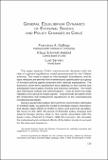Artículo
General equilibrium dynamics of external shocks and policy changes in Chile
Date
2005Abstract
This paper explores Chile’s macroeconomic dynamics with the help of a general equilibrium model parameterized for the Chilean economy. The model is based on microanalytic foundations, and its basic relations are derived from intertemporal optimization by a group of forward-looking agents endowed with rational expectations. The economy’s short-term equilibrium thus depends on the current and anticipated future paths of policy and external variables. The model also introduces critical real-world features—such as short-run wage rigidities and a group of myopic agents—that generate deviations from the frictionless full-employment equilibrium of the unconstrained neoclassical paradigm.
Collections
View/


